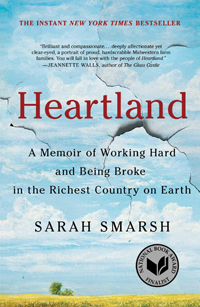 Sarah Smarsh, Heartland: A Memoir of Working Hard and Being Broke in the Richest Country on Earth (New York: Scribner, 2018), 290pp.
Sarah Smarsh, Heartland: A Memoir of Working Hard and Being Broke in the Richest Country on Earth (New York: Scribner, 2018), 290pp.
Part of the American Dream that we're sold is the promise that through hard work, determination, character, and courage, anyone can get ahead in life. There is also a converse corollary to this — that it's your own fault if you remain mired in poverty, that you must be lazy, weak-willed, and probably immoral. And so we valorize the rich as morally worthy and we shame the poor as personally irresponsible.
Sarah Smarsh's Heartland, which is equal parts personal memoir and cultural critique, shows how and why this sort of thinking is so badly wrong. The book was an instant bestseller, and has won two dozen awards, including a National Book Award Finalist. In 2018, Smarsh was a Shorenstein Fellow at the Shorenstein Center on Media, Politics and Public Policy at Harvard University's John F. Kennedy School of Government.
On her father's side, Smarsh grew up a fifth generation Kansas wheat farmer. On her mother's side, she unpacks the chaotic and violent histories of multi-generational poverty in her great-grandmother Dorothy, her grandmother Betty, her mother Jeannie, and, in a clever narrative device, her own unborn child August (what would life be like for her?). Betty, for example, divorced six times and moved more than sixty times. She was also the compassionate and quintessential survivor. Her mother Jeannie attended five schools in five towns one year. Both Betty and Jeannie were teenage mothers. Before she finished high school, Smarsh herself had moved twenty-one times in two Kansas counties. And so she grew up in a constant state of "high alert," knowing how fragile life was, how powerless you can feel in the system, how an invisible hand seems to make decisions for you: "I knew, so deeply that I wasn't even conscious of it, that my family was on the outside of something considered normal."
Smarsh gives a poignant and very powerful voice to the "poor white trash" (her language) that remains culturally invisible to most of us. And "to be made invisible as a class is an invalidation. With invalidation comes shame." These are people like her family who buy their "business suit" at K-Mart, who suffer poor health from lack of adequate health care and bad habits, for whom a speeding ticket or a broken car are a potential disaster. They live in what we dismissively refer to as "fly-over country." Their lives are a disturbing reminder that in America, if you are born poor, you are very likely to remain poor, no matter how hard you work, and no matter that you live in the richest country on earth.
Dan Clendenin: dan@journeywithjesus.net


